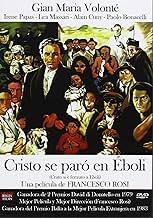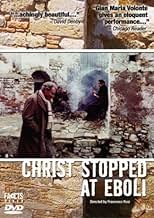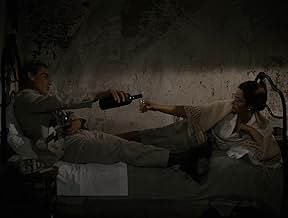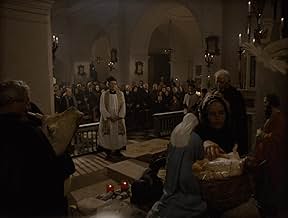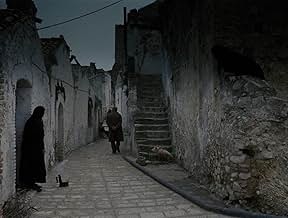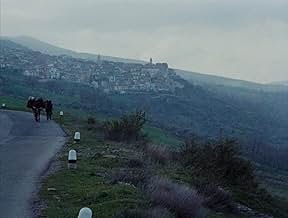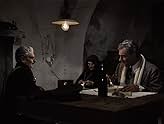IMDb-BEWERTUNG
7,7/10
4585
IHRE BEWERTUNG
Ein Arzt im faschistischen Italien wird wegen seiner politischen Ansichten in ein abgelegenes Dorf ins Exil geschickt.Ein Arzt im faschistischen Italien wird wegen seiner politischen Ansichten in ein abgelegenes Dorf ins Exil geschickt.Ein Arzt im faschistischen Italien wird wegen seiner politischen Ansichten in ein abgelegenes Dorf ins Exil geschickt.
- 1 BAFTA Award gewonnen
- 7 Gewinne & 1 Nominierung insgesamt
Enzo Vitale
- Dottore Milillo
- (as Vincenzo Vitale)
Empfohlene Bewertungen
The transposition of Levi's autobiographical novel can recreate with effectiveness the atmosphere of absolute immobilism out of the history on which the novel really insists. Basilicata's and Southern Italy's setting helps to find a place absolutely uncontaminated by the modernity and the recent history. We wear the dresses of main character that works as a modern sonde in an anti-modern world: in this dimension we see all the contradictions of fascist Italy (of Italy tout court), divided by languages and geographies, where fight the fascism's rhetoric paroxysm against a world deaf to every modern rhythm. The farmer's world is a world based on the slow and circular rhythm of the nature, still impregnated with the sense of the superstitious of the events and of a mythology more ingrained than every fascist super-action.
The sedate interpretation of Volonté contributes to the assumption of a point of view curious, sensible, that can find the deep reasons of the presence of two (or more) Italies and reveal so easy and silent abuses that the potestà and others can carry on on farmers' shoulder. But the main strength of the movie is in a luminous and montalian photography, in a sensual and no overload pittoricism that makes a chromatic and geometric spectacle every single frame.
The sedate interpretation of Volonté contributes to the assumption of a point of view curious, sensible, that can find the deep reasons of the presence of two (or more) Italies and reveal so easy and silent abuses that the potestà and others can carry on on farmers' shoulder. But the main strength of the movie is in a luminous and montalian photography, in a sensual and no overload pittoricism that makes a chromatic and geometric spectacle every single frame.
"If these people in Rome have so much money to spend on war, why don't they spend it here?"
For his antifascist views, the writer and painter Carlo Levi was exiled by Mussolini in 1935 to the gorgeous but rugged and isolated stone town of Aliano in Basilicata, 90km away from Matera. At this time it was an area known for being unchanged over centuries and rather backward by people in the north, and Levi describes it as not even having been visited by Christ, who he says went no further than the train station in Eboli. In one sense religion plays a role here, with one devout landowner saying he's seen a saint at a religious site and a gravedigger saying he saw the devil on a stormy night, but in another sense, they seem to believe more in folklore, ignore the local priest, and only attend mass at holiday time.
From the beginning Levi (played by Gian Maria Volonté) encounters conservative customs and ignorant superstitions, e.g. Daughters who have to spend a year in seclusion if a brother dies (three if it's the father), a doctor who believes the women in town put menstrual blood in "love potions," and the woman whose house he's staying in believing her husband died because a peasant witch put an "evil eye" on him before giving him a deadly magic potion. Eventually Levi takes his own place and hires a maid (Irene Papas) who expresses the peasants' belief that a rainbow causes a certain disease, trash can't be thrown out at night lest it hit the angel that guards the house until daybreak, and that the spirits of the unbaptized can reveal locations of treasure to people in dreams.
Despite being in the middle of nowhere, Levi came to appreciate the hard lives the poor peasants led and saw the injustice of them being ruled from afar by the government to the north, practically a separate Italy, leaving them not represented well at all. They were largely forgotten by the rest of the country until it came time to extract something out of them, e.g. Money for taxes, or young men for war. An example of a new law is higher taxes on goats because they're believed to be bad for farming in the north, but this is terrible for the peasants in this south who depend on them and now feel they have to kill them (beware, there is a butchering scene during this segment, as well as a graphic pig castration scene later). Meanwhile, a cranky tax collector is bitter over how the locals treat him, but who can blame them when he describes his job as taking whatever they have to collect what they owe - a goat, rabbit, wheel of cheese, or bottle of olive oil.
As a warning, this is not a plot-heavy story, and Levi soon settles into the sleepy rhythms of the town, among other things wandering about and watching the kids up to various mischief, like harassing a goat by hitting it with a stick while riding it, or throwing rocks at the local priest. One day Levi lies in a freshly dug grave to beat the heat, and in general he spends time painting and reading the books he can get his hands on. His copy of a book by Montaigne is confiscated by the town mayor as it's in French and deemed "dangerous." The mayor gives a speech to the townsfolk where attendance is mandatory and he extols the virtues of Mussolini invading Abyssinia. He says "The Roman legions once ruled the world. Rome's renewed greatest shines on its seven hills!" to which Levi says privately to himself, "...Shines on the seven hills. But here the hills crumble and turn to dust."
There are some in the town who have escaped their hard life by going to America, but as they're separated from family many of them return. One has a photo of FDR on his wall and is listening to aviator Francesco de Pinedo on a phonograph when Levi meets him (Pinedo was a pioneering Italian aviator who had died in a crash just a couple of years earlier). In another scene there is a rousing folk song performed, one reminding me of Portuguese fado, expressing the bittersweet feelings of being separated from loved ones by going to America.
Levi toes the line in not agitating with his political views, but quietly chafes when the mayor reads all his mail and finds certain correspondences objectionable. The mayor wants to believe he's an educated man like Levi and to talk to him like a fellow intellectual, and their discussions were among the most interesting scenes in the film for me. It's notable that the mayor excuses himself from enlisting in the invasion against Abyssinia because of his "health issues," for isn't this usually the way with these kinds of guys? And meanwhile, Levi expresses a deeper truth, that the peasants have a fundamental distrust of all flags and wars based on history, and moreover, that they view the government as something to be endured, like an event out of nature, completely separate from them. He says:
"The State is 'the people in Rome' who have always existed and always will, like hail, landslides, drought, and malaria. For the peasants, the State is farther away than the sky, and more evil because it's always their adversary. The State is a form of fate like the wind that burns the crops, and the fever that burns the blood."
It's in these moments we get the best feeling for the dynamic between north and south, and some of the south's history, like local feelings for the brigands who surfaced after unification 75 years earlier.
The final episode was rather slow as not much new was revealed, and not much had ever developed with Papas's character. It's probably true to life that way, with Levi expressing his goodbyes to the peasants who had appreciated his doctoring, and ultimately never returning. He has a conversation with his intellectual friends in the north, however, and surprises them by saying that to the south, it wouldn't matter what type of government ruled in Rome - fascist, progressive, or communist - as long as it didn't involve the peasants directly. Even though the book was published nearly 80 years ago, this adaptation is fascinating for its window into an era, as well as a springboard into further reading on Italy's "Southern Question."
For his antifascist views, the writer and painter Carlo Levi was exiled by Mussolini in 1935 to the gorgeous but rugged and isolated stone town of Aliano in Basilicata, 90km away from Matera. At this time it was an area known for being unchanged over centuries and rather backward by people in the north, and Levi describes it as not even having been visited by Christ, who he says went no further than the train station in Eboli. In one sense religion plays a role here, with one devout landowner saying he's seen a saint at a religious site and a gravedigger saying he saw the devil on a stormy night, but in another sense, they seem to believe more in folklore, ignore the local priest, and only attend mass at holiday time.
From the beginning Levi (played by Gian Maria Volonté) encounters conservative customs and ignorant superstitions, e.g. Daughters who have to spend a year in seclusion if a brother dies (three if it's the father), a doctor who believes the women in town put menstrual blood in "love potions," and the woman whose house he's staying in believing her husband died because a peasant witch put an "evil eye" on him before giving him a deadly magic potion. Eventually Levi takes his own place and hires a maid (Irene Papas) who expresses the peasants' belief that a rainbow causes a certain disease, trash can't be thrown out at night lest it hit the angel that guards the house until daybreak, and that the spirits of the unbaptized can reveal locations of treasure to people in dreams.
Despite being in the middle of nowhere, Levi came to appreciate the hard lives the poor peasants led and saw the injustice of them being ruled from afar by the government to the north, practically a separate Italy, leaving them not represented well at all. They were largely forgotten by the rest of the country until it came time to extract something out of them, e.g. Money for taxes, or young men for war. An example of a new law is higher taxes on goats because they're believed to be bad for farming in the north, but this is terrible for the peasants in this south who depend on them and now feel they have to kill them (beware, there is a butchering scene during this segment, as well as a graphic pig castration scene later). Meanwhile, a cranky tax collector is bitter over how the locals treat him, but who can blame them when he describes his job as taking whatever they have to collect what they owe - a goat, rabbit, wheel of cheese, or bottle of olive oil.
As a warning, this is not a plot-heavy story, and Levi soon settles into the sleepy rhythms of the town, among other things wandering about and watching the kids up to various mischief, like harassing a goat by hitting it with a stick while riding it, or throwing rocks at the local priest. One day Levi lies in a freshly dug grave to beat the heat, and in general he spends time painting and reading the books he can get his hands on. His copy of a book by Montaigne is confiscated by the town mayor as it's in French and deemed "dangerous." The mayor gives a speech to the townsfolk where attendance is mandatory and he extols the virtues of Mussolini invading Abyssinia. He says "The Roman legions once ruled the world. Rome's renewed greatest shines on its seven hills!" to which Levi says privately to himself, "...Shines on the seven hills. But here the hills crumble and turn to dust."
There are some in the town who have escaped their hard life by going to America, but as they're separated from family many of them return. One has a photo of FDR on his wall and is listening to aviator Francesco de Pinedo on a phonograph when Levi meets him (Pinedo was a pioneering Italian aviator who had died in a crash just a couple of years earlier). In another scene there is a rousing folk song performed, one reminding me of Portuguese fado, expressing the bittersweet feelings of being separated from loved ones by going to America.
Levi toes the line in not agitating with his political views, but quietly chafes when the mayor reads all his mail and finds certain correspondences objectionable. The mayor wants to believe he's an educated man like Levi and to talk to him like a fellow intellectual, and their discussions were among the most interesting scenes in the film for me. It's notable that the mayor excuses himself from enlisting in the invasion against Abyssinia because of his "health issues," for isn't this usually the way with these kinds of guys? And meanwhile, Levi expresses a deeper truth, that the peasants have a fundamental distrust of all flags and wars based on history, and moreover, that they view the government as something to be endured, like an event out of nature, completely separate from them. He says:
"The State is 'the people in Rome' who have always existed and always will, like hail, landslides, drought, and malaria. For the peasants, the State is farther away than the sky, and more evil because it's always their adversary. The State is a form of fate like the wind that burns the crops, and the fever that burns the blood."
It's in these moments we get the best feeling for the dynamic between north and south, and some of the south's history, like local feelings for the brigands who surfaced after unification 75 years earlier.
The final episode was rather slow as not much new was revealed, and not much had ever developed with Papas's character. It's probably true to life that way, with Levi expressing his goodbyes to the peasants who had appreciated his doctoring, and ultimately never returning. He has a conversation with his intellectual friends in the north, however, and surprises them by saying that to the south, it wouldn't matter what type of government ruled in Rome - fascist, progressive, or communist - as long as it didn't involve the peasants directly. Even though the book was published nearly 80 years ago, this adaptation is fascinating for its window into an era, as well as a springboard into further reading on Italy's "Southern Question."
"Christ stopped at Eboli" (or in Italian "Cristo si e fermato a Eboli") is a rather hard to find movie. The theatrical release is about 2,5 hours long, but I saw the TV movie, that is nearly an hour longer.
The movie is about the banishment of narrator Carlo Levi in 1935 - 1936. Levi was a left wing intellectual and critic of Italian dictator Benito Mussolini.
The story is situated during the war between Italy and Abyssinia (todays Ethiopia), so before the Second World War.
In spite of the title, the movie is neither about Christ nor about Eboli.
Not about Eboli because the train station of Eboli is only a stopover in the journey of Levi to his banishment location of Grassano and Luciano, two small villages in the Southern region of Lucania (today Basilicata).
Not about Christ because in the remote villages of Grassano and Lucania the Roman Catholic faith is only a surface below which ancient pagan beliefs still lives on.
In his banishment location Levi enjoys a great deal of freedom. Mussolini is more concerned with getting rid of him in the political discourse than to punish him. At the beginning Levi is first of all an observing outsider but gradually he integrates with the local community, in no small measure thanks to his medical knowledge.
"Christ stopped at Eboli" is a film about the wealth difference between North- and South Italy. Levi encounters instances of malaria in his banishment location. Many citizens try to flee the poverty by emigrating to the United States. The "emotional distance" to New York seems almost shorter than to Rome.
But "Christ stopped at Eboli" is in particular a film about the mixture of Christianity and pagan beliefs. In many instances we see this combination in horror like movies (compare "The wicker man", 1973, Robin Hardy) but in "Christ stopped at Eboli" it is used to full effect in a social drama.
The film is above all a slow movie, in the good sense of the word. The central theme is the gradual integration of he main character in the local community, "gradual" being the essential word in this sentence.
Francesco Rosi is not a very well known director. He is of the same generation as the more popular Taviani brothers. "Christ stopped at Eboli" has also some resemblance with some Taviani movies, situated as it is in the poor South. I am thinking of "Padre Padrone" (1977) in particular. Compared with "Christ stopped at Eboli" "Padre Padrone" is however nearly an action movie.
The movie is about the banishment of narrator Carlo Levi in 1935 - 1936. Levi was a left wing intellectual and critic of Italian dictator Benito Mussolini.
The story is situated during the war between Italy and Abyssinia (todays Ethiopia), so before the Second World War.
In spite of the title, the movie is neither about Christ nor about Eboli.
Not about Eboli because the train station of Eboli is only a stopover in the journey of Levi to his banishment location of Grassano and Luciano, two small villages in the Southern region of Lucania (today Basilicata).
Not about Christ because in the remote villages of Grassano and Lucania the Roman Catholic faith is only a surface below which ancient pagan beliefs still lives on.
In his banishment location Levi enjoys a great deal of freedom. Mussolini is more concerned with getting rid of him in the political discourse than to punish him. At the beginning Levi is first of all an observing outsider but gradually he integrates with the local community, in no small measure thanks to his medical knowledge.
"Christ stopped at Eboli" is a film about the wealth difference between North- and South Italy. Levi encounters instances of malaria in his banishment location. Many citizens try to flee the poverty by emigrating to the United States. The "emotional distance" to New York seems almost shorter than to Rome.
But "Christ stopped at Eboli" is in particular a film about the mixture of Christianity and pagan beliefs. In many instances we see this combination in horror like movies (compare "The wicker man", 1973, Robin Hardy) but in "Christ stopped at Eboli" it is used to full effect in a social drama.
The film is above all a slow movie, in the good sense of the word. The central theme is the gradual integration of he main character in the local community, "gradual" being the essential word in this sentence.
Francesco Rosi is not a very well known director. He is of the same generation as the more popular Taviani brothers. "Christ stopped at Eboli" has also some resemblance with some Taviani movies, situated as it is in the poor South. I am thinking of "Padre Padrone" (1977) in particular. Compared with "Christ stopped at Eboli" "Padre Padrone" is however nearly an action movie.
This is a story that had to be told. It might not have been had not Carlo Levi been exiled in 1935 for his anti-fascist activities to a town in the remote, impoverished Southern province of Lucania. His non-ideological, unsentimentalised, beautifully observed memoir of the year he spent there has been vividly realised by Francesco Rosi whose films are noted for their depiction of inequalities and injustices. The political activism of Gian Maria Volonté has been well-documented so this film could be seen as a distillation of the beliefs of both actor and director. The author himself had passed away four years earlier but this adaptation would surely have met with his approval.
Volonté's mellow, nuanced and understated portrayal of Levi, sadly overlooked in terms of awards, is indisputably one of his finest. It was the performance of Lea Massari in a comparatively small role as his wife that was recognised and very good she is too. Also appearing are the glorious Irene Papas and the always enigmatic Alain Cuny. Rosi of course was renowned for his skill with actors.
This is about a region that time has forgotten and for which its nation does not care. Looked down upon by the rich, industrialised North, economically depressed, lacking the basics of life and with no facilities, its residents have succumbed to superstition and mysticism. As for Religion "Christ stopped short of here" and its sole representative is a drunken, discredited priest. The pro-fascist mayor, played by Paolo Bonacelli, tries to get the inhabitants interested in the radio broadcasts of Mussolini but they are totally indifferent and simply do not care that Addis Abbaba has fallen! Ironically it was the young men of this region who supplied so much of the cannon fodder in the trenches of WW1 which was the subject of Rosi's earlier 'Uomini Contro'.
Originally made for television this slightly truncated version certainly belies its length and epitomises Rosi's aim to make his audience more than just 'passive spectators'. Piero Piccioni has composed a haunting score and the cinematography of Pasqualino de Santis is breathtaking. Unlike so many Italian films it is not marred by the booming voices of post-synchronisation and the dubbing of the gallery of characters is expertly done.
Carlo Levi wrote that "the whole of life is a tragedy without a stage" but here Rosi does not lay it on with a trowel and this magnificent film becomes, despite the hardships it depicts, an affirmation of life.
Volonté's mellow, nuanced and understated portrayal of Levi, sadly overlooked in terms of awards, is indisputably one of his finest. It was the performance of Lea Massari in a comparatively small role as his wife that was recognised and very good she is too. Also appearing are the glorious Irene Papas and the always enigmatic Alain Cuny. Rosi of course was renowned for his skill with actors.
This is about a region that time has forgotten and for which its nation does not care. Looked down upon by the rich, industrialised North, economically depressed, lacking the basics of life and with no facilities, its residents have succumbed to superstition and mysticism. As for Religion "Christ stopped short of here" and its sole representative is a drunken, discredited priest. The pro-fascist mayor, played by Paolo Bonacelli, tries to get the inhabitants interested in the radio broadcasts of Mussolini but they are totally indifferent and simply do not care that Addis Abbaba has fallen! Ironically it was the young men of this region who supplied so much of the cannon fodder in the trenches of WW1 which was the subject of Rosi's earlier 'Uomini Contro'.
Originally made for television this slightly truncated version certainly belies its length and epitomises Rosi's aim to make his audience more than just 'passive spectators'. Piero Piccioni has composed a haunting score and the cinematography of Pasqualino de Santis is breathtaking. Unlike so many Italian films it is not marred by the booming voices of post-synchronisation and the dubbing of the gallery of characters is expertly done.
Carlo Levi wrote that "the whole of life is a tragedy without a stage" but here Rosi does not lay it on with a trowel and this magnificent film becomes, despite the hardships it depicts, an affirmation of life.
Christ Stopped at Eboli is one of the best movies by Rossi, loyal to his tradition of neorealism. The movie depicts isolated rural-peasant life as an account of an urban intellectual doctor, painter and a political activist who has been exiled to this remote area due to his political dissent during the Fascist rule in Italy. Not like similar movies in lenght, Crist Stopped at Eboli constantly absorbs audience, probably due to its realist description and selective representation of peasant life which is "frozen in time". The film pushes the audience to contemplate on philosophical aspects of the concept of time and it is heavily imbued with the display of social and political problems.
Rosi beautifully describes the destitute of the peasant settlers of this remote and isolated land, their ignorance and apolitical life, the deep rift between these people and state, and the irrelevance of the quasi-comic "victories" of the Il Duce to these people among many other social and political issues. Like Rosi's other movies here again neorealist representation goes along with the combination of documentary techniques and fictional context. Rosi lets the images to speak for themselves rather than the Gian Maria Volente who is in the central role in the movie.
In the movie (as it is in the book), the peasant life and urbanity are represented as two alien civilizations and antithesis of each other. These peasants have their own way of life, own customs, own aspirations and means of joy. What is going on Rome or the war in Abyssinia for "regaining the glory of the Rome" does not capture their interest. They are aware of the state through the taxes collected or men called for military service. In his letter, Levi describes the urban civilization as an antithesis of this peasant life which aspired throughout the history to "colonize" it.
The Christ Stopped at Eboli also pushes the audience to ponder on the philosophical meaning of history, its relevance nature and meaning. It describes this peasant life as "frozen in history", cut from outside life and lacking the understanding of time that we have. History as we understand is the history of "urban civilization". As peasants are alien to this civilization they are alien to this concept of time as well. In the village you stop counting days, hours as they become more and more irrelevant, there you return and base your life on the natural cycle of life which is based on seasons. In this sense the movie challenges our notion of history which is the history of the "city".
In this sense Christ Stopped at Eboli is very analogous to Y. K. Karaosmanoğlu's Yaban. Yaban is also the story of a Turkish intellectual war veteran who abandons amenities of Istanbul for the Central Anatolian village with the hope of finding his roots and alleviating the torments of his memoirs. However, to his disappointment he finds himself in an alien peasant "civilization" where he can not communicate to those people, can not be similar to them and can not understand their aspirations. What makes Yaban and Christ stopped at Eboli similar is their approach to dichotomous nature of human civilization and the concept of time. In both novels there is a representation of antagonist peasant and urban civilizations, and a relative concept of time. In both novels there is description of life which is "frozen in time" and alien to urbanity. Indeed the study of Yaban from this perspective can be insightful for the discussions of continuity and change in the History of Mediterranean, as Turkey is widely excluded from such studies. However when you read Christ stopped at Eboli and Yaban what strikes you first is the patterns of similarity in peasant life and experience of the intellectuals visiting these places. They can back both the universality of "two civilizations" argument and lounge duree approach in the Mediterranean area.
Rosi beautifully describes the destitute of the peasant settlers of this remote and isolated land, their ignorance and apolitical life, the deep rift between these people and state, and the irrelevance of the quasi-comic "victories" of the Il Duce to these people among many other social and political issues. Like Rosi's other movies here again neorealist representation goes along with the combination of documentary techniques and fictional context. Rosi lets the images to speak for themselves rather than the Gian Maria Volente who is in the central role in the movie.
In the movie (as it is in the book), the peasant life and urbanity are represented as two alien civilizations and antithesis of each other. These peasants have their own way of life, own customs, own aspirations and means of joy. What is going on Rome or the war in Abyssinia for "regaining the glory of the Rome" does not capture their interest. They are aware of the state through the taxes collected or men called for military service. In his letter, Levi describes the urban civilization as an antithesis of this peasant life which aspired throughout the history to "colonize" it.
The Christ Stopped at Eboli also pushes the audience to ponder on the philosophical meaning of history, its relevance nature and meaning. It describes this peasant life as "frozen in history", cut from outside life and lacking the understanding of time that we have. History as we understand is the history of "urban civilization". As peasants are alien to this civilization they are alien to this concept of time as well. In the village you stop counting days, hours as they become more and more irrelevant, there you return and base your life on the natural cycle of life which is based on seasons. In this sense the movie challenges our notion of history which is the history of the "city".
In this sense Christ Stopped at Eboli is very analogous to Y. K. Karaosmanoğlu's Yaban. Yaban is also the story of a Turkish intellectual war veteran who abandons amenities of Istanbul for the Central Anatolian village with the hope of finding his roots and alleviating the torments of his memoirs. However, to his disappointment he finds himself in an alien peasant "civilization" where he can not communicate to those people, can not be similar to them and can not understand their aspirations. What makes Yaban and Christ stopped at Eboli similar is their approach to dichotomous nature of human civilization and the concept of time. In both novels there is a representation of antagonist peasant and urban civilizations, and a relative concept of time. In both novels there is description of life which is "frozen in time" and alien to urbanity. Indeed the study of Yaban from this perspective can be insightful for the discussions of continuity and change in the History of Mediterranean, as Turkey is widely excluded from such studies. However when you read Christ stopped at Eboli and Yaban what strikes you first is the patterns of similarity in peasant life and experience of the intellectuals visiting these places. They can back both the universality of "two civilizations" argument and lounge duree approach in the Mediterranean area.
Wusstest du schon
- WissenswertesThe title of the film and its source novel comes from an expression by the people of Gagliano who say of themselves, "Christ stopped short of here, at Eboli" which means, in effect, that they feel they have been bypassed by Christianity, by morality, by history itself-that they have somehow been excluded from the full human experience.
- PatzerOn the bus, the way Carlo holds the dog changes.
- Zitate
Luisa Levi: You'd need a woman here.
Carlo Levi: Yes, I would. But it's not easy.
Luisa Levi: Come on, don't exaggerate. Don't tell me that here even finding a cleaning lady is impossible.
Carlo Levi: Here a woman wouldn't go in the house of a single man. Just spending time together implies sleeping together.
Luisa Levi: You can't be serious.
Carlo Levi: Oh, yes I am.
- Alternative VersionenThere are many versions ranging from 120 minutes to 222 minutes. The longest version available in the U.S. is 222 minutes and is available from the Criterion Collection on Blu-ray.
- VerbindungenFeatured in Il cineasta e il labirinto (2004)
Top-Auswahl
Melde dich zum Bewerten an und greife auf die Watchlist für personalisierte Empfehlungen zu.
- How long is Christ Stopped at Eboli?Powered by Alexa
Details
- Erscheinungsdatum
- Herkunftsländer
- Offizieller Standort
- Sprache
- Auch bekannt als
- Christ Stopped at Eboli
- Drehorte
- Aliano, Matera, Basilicata, Italien(second house where Levi lives)
- Produktionsfirmen
- Weitere beteiligte Unternehmen bei IMDbPro anzeigen
Box Office
- Bruttoertrag in den USA und Kanada
- 78.736 $
- Eröffnungswochenende in den USA und in Kanada
- 9.006 $
- 7. Apr. 2019
- Weltweiter Bruttoertrag
- 78.736 $
Zu dieser Seite beitragen
Bearbeitung vorschlagen oder fehlenden Inhalt hinzufügen



